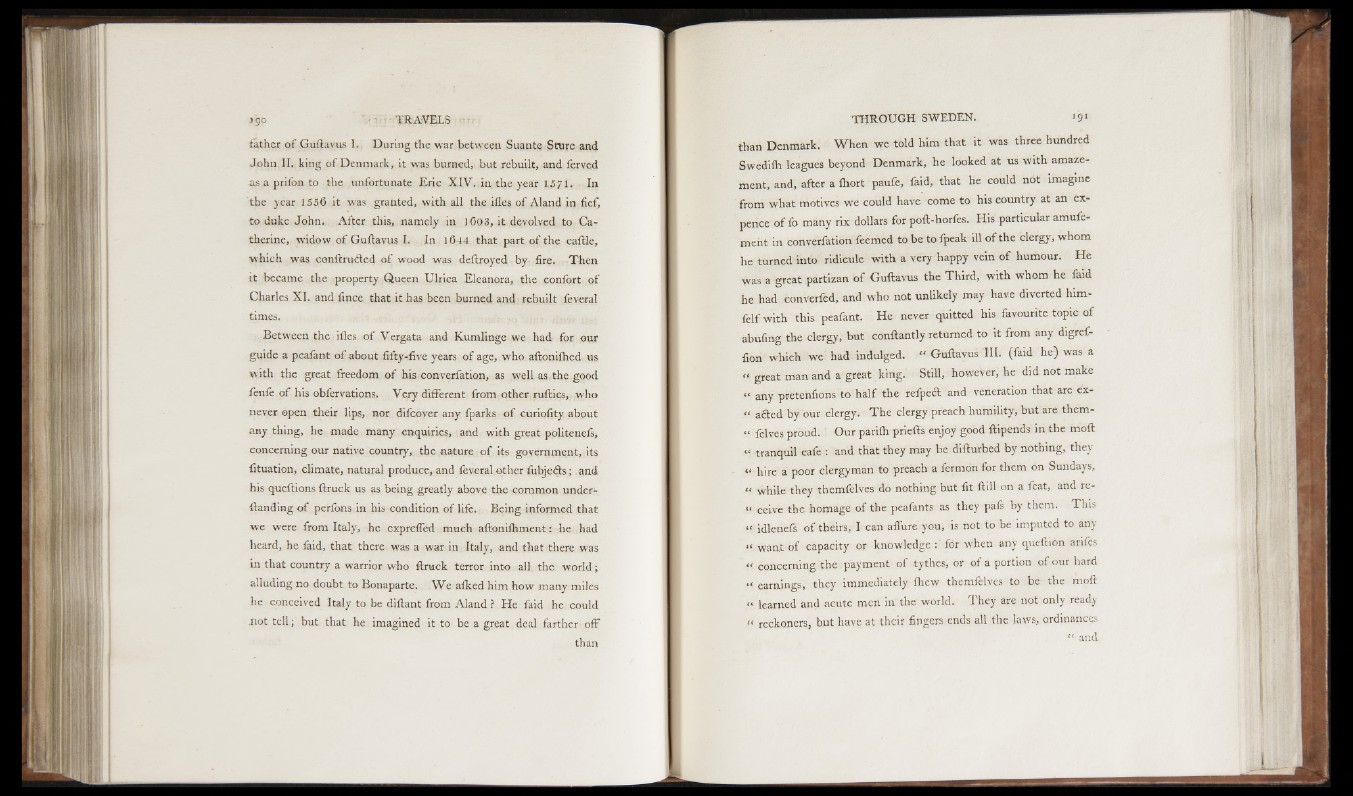
father o f Guftavus I. During the war between Suante Sttare and
John II. king o f Denmark, it was burned, but rebuilt, and ferved
as a prilon to the unfortunate Eric X IV ,in the year 15 7 i . In
the year 1550 it was granted, with all the ifles o f Aland in fief,
to duke John. After this, namely in 1003, it devolved to Catherine,
widow o f Guftavus I. In 16-14 that part o f the caftle,
which was conftruited o f wood Was deftroyed by fire. Then
it became the property Queen Ulrica Eleanora, the confort of
Charles XI. and fince that it has been burned and rebuilt feveral
times.
Between the ifles o f Vergata and Kumlinge we had for our
guide a peaiant o f about fifty-five years o f age, who aftoniihed us
with the great freedom o f his converlation, as well as the good
fenfe o f his obfervations. Very different from other ruftics, who
never open their lips, nor difcover any fparks o f curiofity about
any thing, he made many enquiries, and with great politeneis,
concerning our native country, the nature o f its government, its
fituation, climate, natural produce, and leveral other fubjefts; and
his queftions ftruck us as being greatly above the common under-
flan ding o f perfons in his condition o f life. Being informed that
we were from Italy, he expreffed much aftoniihment: he had
heard, he faid, that there, was a war in Italy, and that there was
in that country a warrior who ftruck terror into all the world;
alluding no doubt to Bonaparte. W e alked him how many miles
he conceived Italy to be diftant from Aland ? He faid he could
not te ll; but that he imagined it to be a great deal farther off
than
than Denmark. W h en we told him that it was three hundred
Swediih leagues beyond Denmark, he looked at us with amazement,
and, after a ihort paufe, faid, that he could not imagine
from what motives we could have come to his country at an expence
o f fo many rix dollars for poft-horfes. His particular amufe-
ment in converfation feemed to be to fpeak ill o f the clergy, whom
he turned into ridicule with a very happy vein o f humour. He
was a great partizan o f Guftavus the Third, with whom he faid
he had converfed, and who not unlikely may have diverted him-
felf with this peafant. He never quitted his favourite topic o f
abufing the clergy, but conftantly returned to it from any digref-
fion which we had indulged. “ Guftavus III. (faid he) was a
“ great man and a great king. Still, however, he did not make
“ any pretenfions to half the refpeft and veneration that are ex-
“ ailed by our clergy. T he clergy preach humility, but are them-
“ felves proud. Our parilh priefts enjoy good {Upends in the moft
“ tranquil eafe : and that they may be difturbed by nothing, they
“ hire a poor clergyman to preach a fermon for them on Sundays,
■ while they themfelves do nothing but fit ftill on a feat, and re-
“ ceive the homage o f the peafants as they pals by them. This
“ idlcnefs o f theirs, I can affure you, is not to be imputed to any
“ want o f capacity or knowledge : for when any queftion arifes
“ concerning the payment o f tythes, or o f a portion o f our hard
“ earnings, they immediately {hew themfelves to be the moft
“ learned and acute men in the world. They are not only ready
“ reckoners, but have at their fingers ends all the laws, ordinances
“ and.